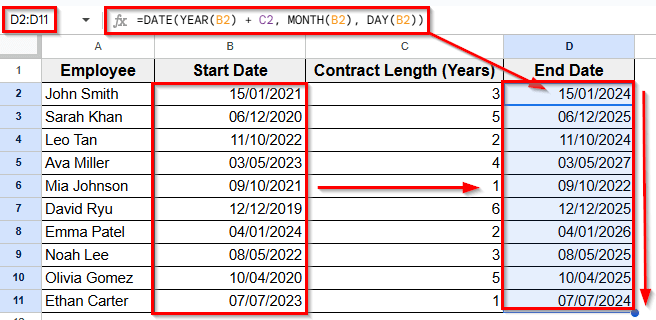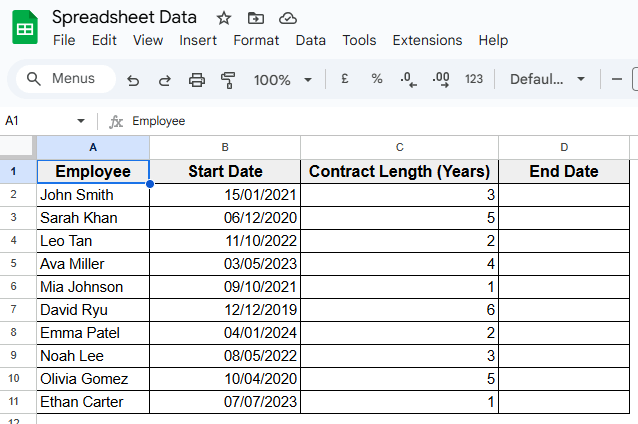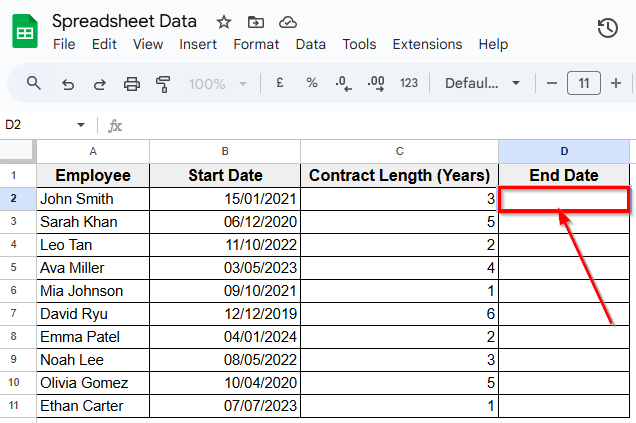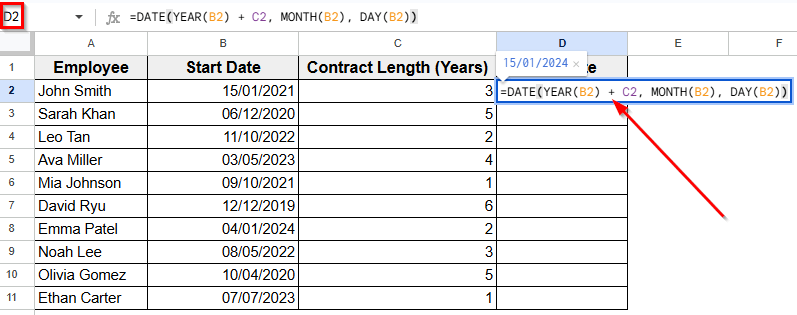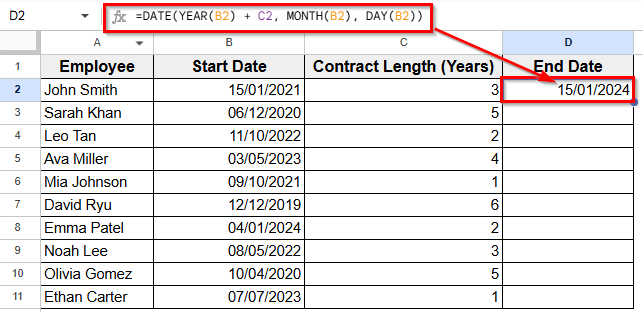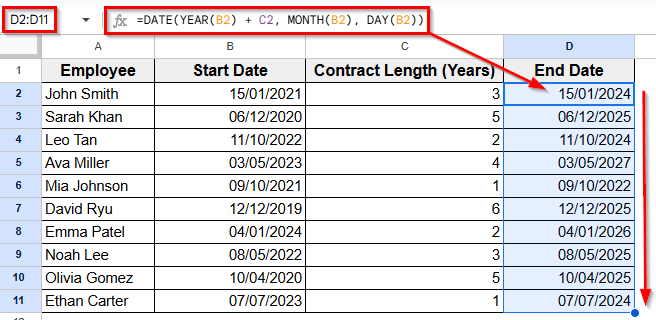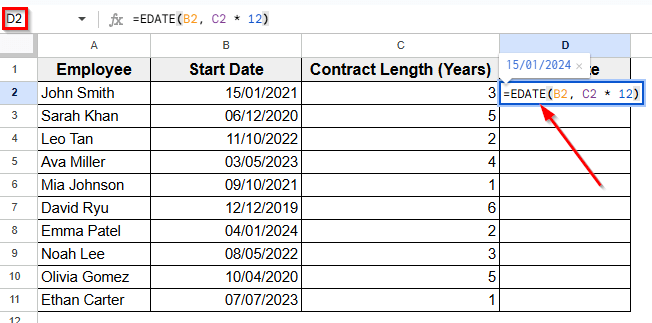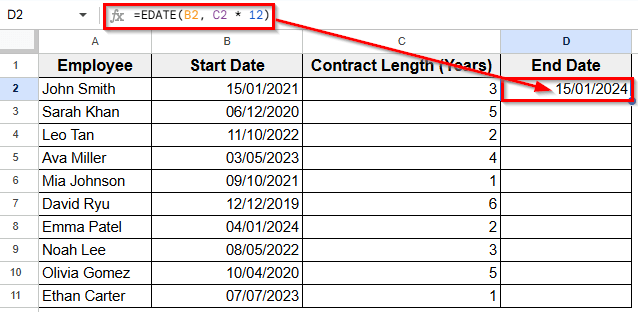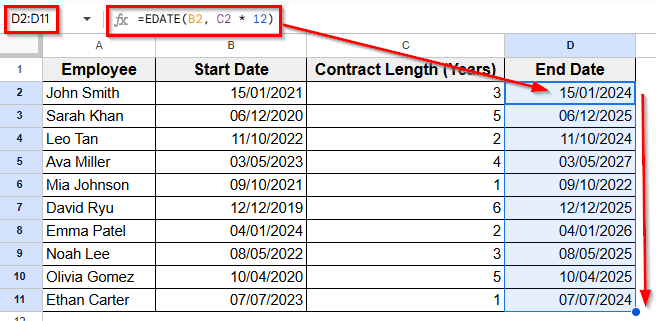Adding years to a date in Google Sheets is useful when you work with time-based data. Google Sheets makes this easy with built-in date functions that calculate new dates based on your current ones. It helps you keep track of things like contract periods, license renewals, event planning, or warranty expiration.
For example, if someone signed a contract on January 1, 2022 for 3 years, you’d want the spreadsheet to show the end date as January 1, 2025. Doing this manually for each row takes time and can lead to mistakes, especially with large datasets.
In this article, you’ll learn how to add years to a date step by step using simple formulas that work for any dataset.
Here’s a simple step-by-step guide on how to add years to a date in Google Sheets using the EDATE function:
➤ Open your dataset in Google Sheets.
➤ Select cell D2 to calculate the end date.
➤ Type this formula =EDATE(B2, C2 * 12)
➤ Next, press Enter. The result will be a new date after adding the correct number of months.
➤ Drag the formula down through Column D to fill the rest of the results.
Using The DATE Function to Add Years
In the following dataset, we take a list of employees with their Contract Start Dates and the Contract Duration (Years). There are three columns labeled Employee, Start Date, and Contract Length (Years). Column A includes employee names, Column B shows the date when their contracts started, and Column C indicates how long each contract lasts.
We’ll use Column D to calculate the End Date by adding the number of years from Column C to the Start Date.
The DATE function is the most direct way to add years to a date in Google Sheets. It rebuilds a date using the original year, month, and day. You can increase the year by simply adding a number to it.
This method is helpful when you’re working with start dates and need to add a fixed number of years, like employee contracts, project timelines, membership durations, or course schedules.
Follow these steps to apply this formula:
➤ Open your dataset in Google Sheets.
➤ Click on cell D2, where you want to display the end date.
➤ Type this formula:
=DATE(YEAR(B2) + C2, MONTH(B2), DAY(B2))
➤ Press Enter.
➤ You’ll see the contract end date by adding the number of years from Column C to the start date in Column B.
➤ Now drag the fill handle down to apply the formula to the rest of Column D.
Apply EDATE Function to Add Years by Months
If you want a faster method using month-based math, try the EDATE function. It lets you add months to a date, which makes it easy to add years by multiplying the number of years by 12.
Here’s a simple steps how to use this method:
➤ Open your dataset in Google Sheets.
➤ Select cell D2 to calculate the end date.
➤ Type this formula:
=EDATE(B2, C2 * 12)
➤ Next, press Enter. The result will be a new date after adding the correct number of months.
➤ Drag the formula down through Column D to fill the rest of the results.
Frequently Asked Questions
What is the formula to add years to a date in Google Sheets?
To add years to a date, use this formula:
=DATE(YEAR(start_date) + number_of_years, MONTH(start_date), DAY(start_date))
For example: =DATE(YEAR(B2) + C2, MONTH(B2), DAY(B2))
It returns a new date with the added years while keeping the same month and day.
How to add up year to date in Google Sheets?
To add years to a date, use the DATE function with YEAR, MONTH, and DAY.
Here’s how to do it:
➤ Open your Google sheets and click on the cell where you want the result.
➤ Type the formula =DATE(YEAR(B2) + 3, MONTH(B2), DAY(B2))
➤ Press Enter. This will add 3 years to the date in cell B2.
How to autofill years in Google Sheets?
To autofill a list of dates that increase by year, enter the first two years and use the fill handle to continue the pattern.
Here’s how to do that:
➤ Click on a cell and type the first date, like 01/01/2020.
➤ In the next cell, type 01/01/2021.
➤ Select both cells.
➤ Drag the fill handle down through the column.
➤ Google Sheets will automatically fill each row with the next year’s date.
Wrapping Up
These methods will help you save time and effort when you’re working with time-based data and need to add years to dates in Google Sheets. Use the DATE function when you need full control over the year, month, and day. Try the EDATE function for a quick solution using months.
These two simple functions help you to add years to date, especially when working with recurring schedules, contract timelines, renewal dates, or track future deadlines.

